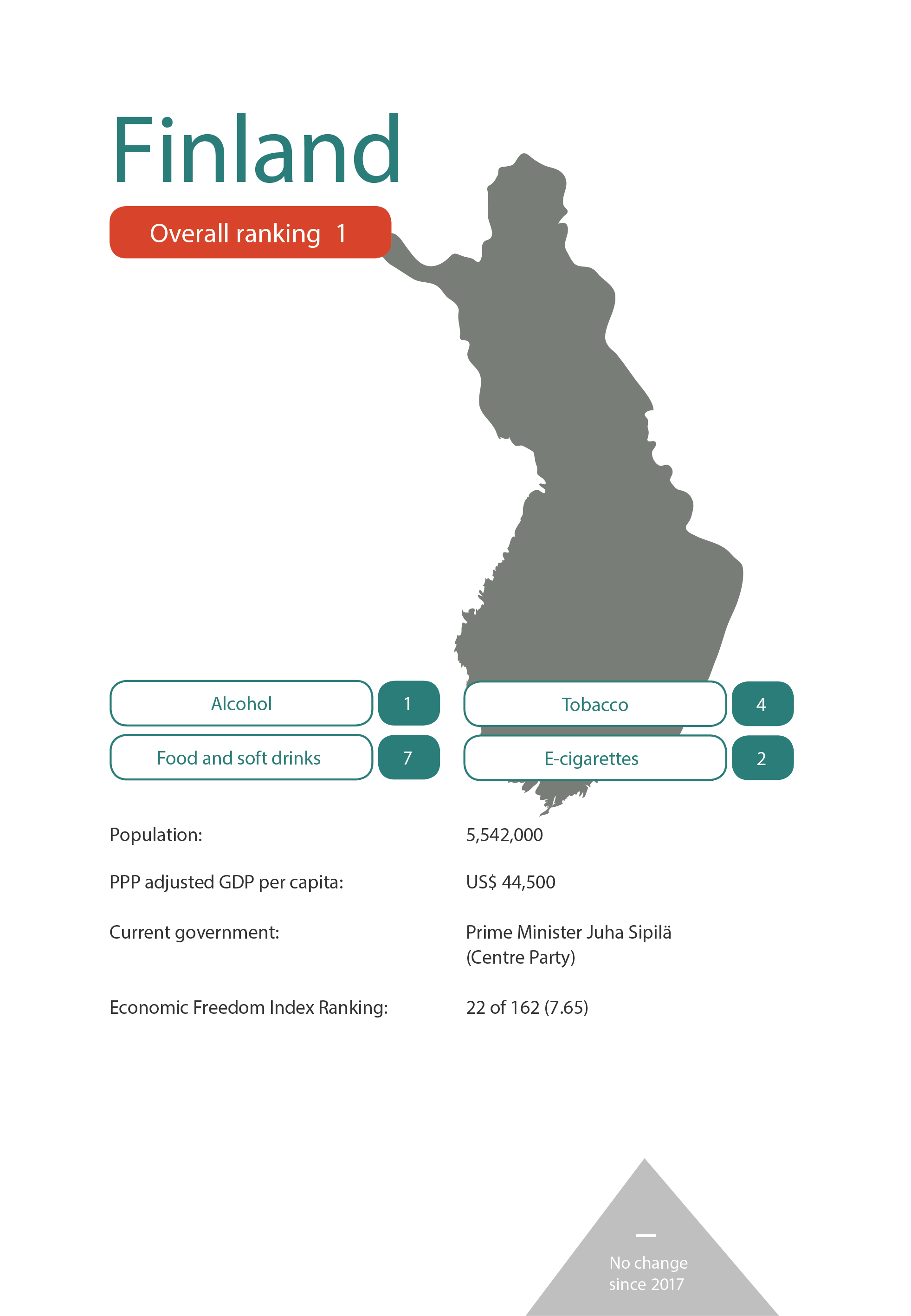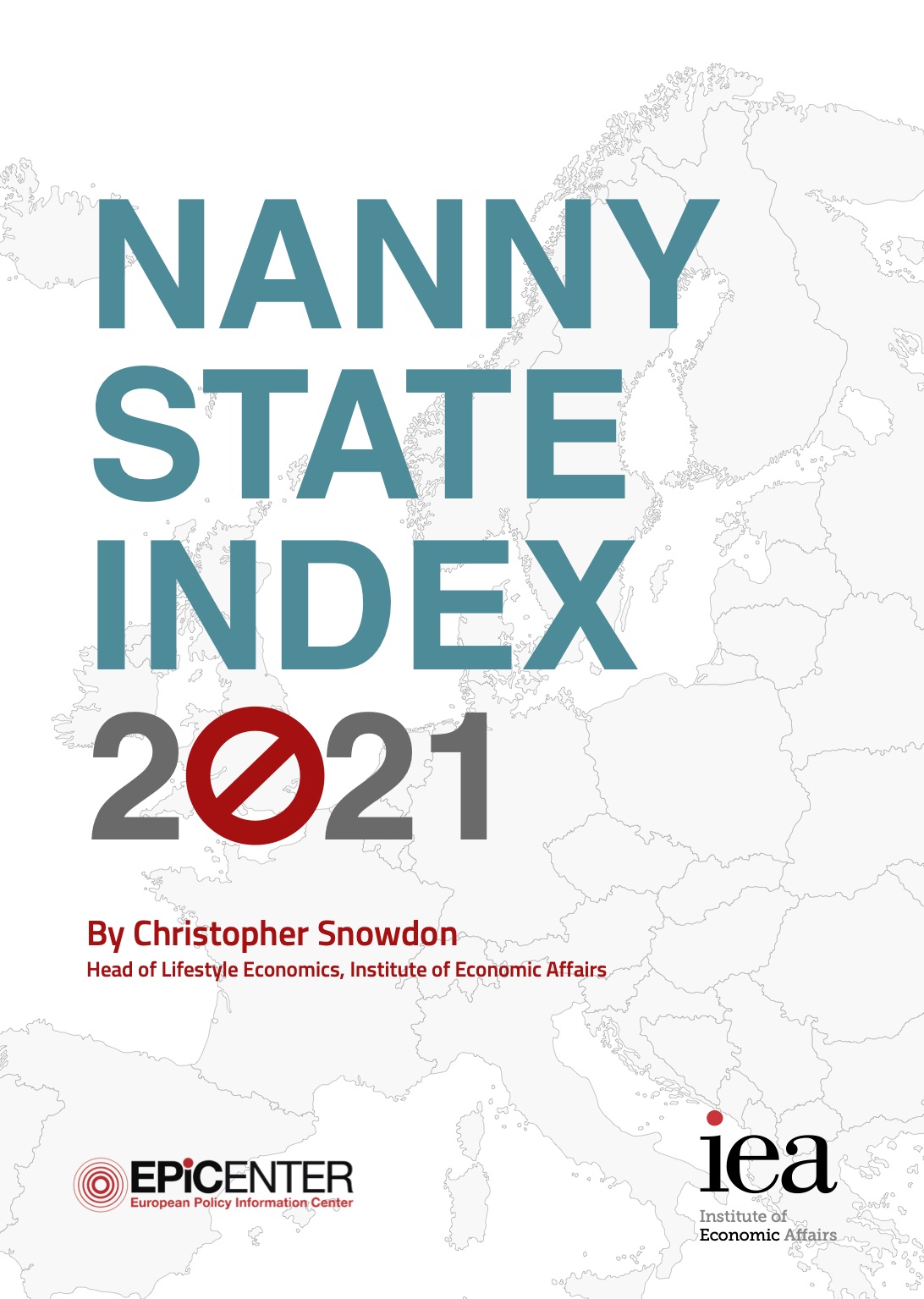
Finland retains the dubious honour of being the EU’s number one nanny state with a commanding lead. It has the highest taxes on beer and wine in the EU and its spirits duty is only exceeded – by a whisker – by neighbouring Sweden. It has the third highest rate of tobacco duty as well as having taxes on sugary drinks and e-cigarette fluids.
Finland is unusual in having a state monopoly on alcohol sales. Recent years have seen a degree of liberalisation with a new Alcohol Act, which came into effect in March 2018, allowing the sale of alcoholic drinks of up to 5.5 per cent to be sold in grocery stores. It also permits restaurants to advertise their happy hour discounts, and restaurant opening hours have been relaxed. Finland’s state-owned retailer Alko has had its closing time pushed back from 8pm to 9pm.
These modest measures, which were opposed by many campaigners, represent the limits of Finnish liberalisation. Nearly all alcohol advertising outdoors was banned in 2015. Spirits cannot be advertised in any media. Wine and beer can only be advertised on television after 10pm.
Finland’s Tobacco Act, which came into force on August 15th 2016, banned smoking in cars carrying children under the age of 15. All smokeless tobacco has been banned and e-cigarettes are subject to the same regulation as tobacco, including a full advertising ban. Not only does this ban include e-cigarettes, it also includes products that resemble tobacco products, such as liquorice pipes. Shops have to buy a licence to sell tobacco and the price of the licences has risen sharply since 2016 in a deliberate attempt to discourage retailers from selling it. The new Tobacco Act also allows housing corporations to apply for a licence to make smoking illegal on their balconies and outdoor areas.
E-cigarettes used to be illegal in Finland but the prohibition ended on May 20th 2016. A punitive tax on e-cigarette fluid of €0.30 per ml (€3.00 per standard bottle) was introduced on 1st January 2017 and applies to ‘nicotine free liquids intended for vapourisation’ as well as nicotine-containing fluids. Internet and cross-border sales of e-cigarettes have been illegal since June 2017. Finland is one of the few European countries to have major restrictions on flavours. Only tobacco-flavoured and unflavoured fluid is allowed to be sold.
Perhaps due to the cold climate, Finland has a less draconian smoking ban than some EU countries and permits designated smoking rooms, but vaping is banned wherever smoking is banned and some outdoor areas are included. In addition to a total ban on tobacco advertising, there is a retail display ban and a vending machine ban. Another wave of anti-smoking policies could be on its way. In October 2018, a working group of the Ministry of Social Affairs and Health put forward a raft of new measures including raising the purchasing age to 20, banning smoking (and vaping) in parks, beaches and bus stops, and reducing the amount of snus that can be brought into the country for personal use from one kilogram to 100 grams.
Finland abolished its tax on confectionery, chocolate and ice cream in January 2017. A tax on fizzy drinks remains in place at a rate of €0.22 per litre of sugar-sweetened drinks and €0.11 per litre of non-sugary drinks.
About
The Nanny State Index (NSI) is a league table of the worst places in Europe to eat, drink, smoke and vape. The initiative was launched in March 2016 and was a media hit right across Europe. It is masterminded and led by IEA’s Christopher Snowdon with partners from all over Europe.
Enquiries: info@epicenternetwork.eu
Download Publication

Previous version: 2019
Categories
About the Editor
Christopher Snowdon is the head of Lifestyle Economics at the Institute of Economic Affairs. His research focuses on lifestyle freedoms, prohibition and policy-based evidence. He is a regular contributor to the Spectator, Telegraph and Spiked and often appears on TV and radio discussing social and economic issues.
Snowdon’s work encompasses a diverse range of topics including ‘sin taxes’, state funding of charities, happiness economics, ‘public health’ regulation, gambling and the black market. Recent publications include ‘Drinking, Fast and Slow’, ‘The Proof of the Pudding: Denmark’s Fat Tax Fiasco’, ‘A Safer Bet’, and ‘You Had One Job’. He is also the author of ‘Killjoys’ (2017), ‘Selfishness, Greed and Capitalism’ (2015), ‘The Art of Suppression’ (2011), ‘The Spirit Level Delusion’ (2010), ‘Velvet Glove, Iron Fist’ (2009).
Finland 2019

Finland retains the dubious honour of being the EU’s number one nanny state with a commanding lead. It has the highest taxes on beer and wine in the EU and its spirits duty is only exceeded – by a whisker – by neighbouring Sweden. It has the third highest rate of tobacco duty as well as having taxes on sugary drinks and e-cigarette fluids.
Finland is unusual in having a state monopoly on alcohol sales. Recent years have seen a degree of liberalisation with a new Alcohol Act, which came into effect in March 2018, allowing the sale of alcoholic drinks of up to 5.5 per cent to be sold in grocery stores. It also permits restaurants to advertise their happy hour discounts, and restaurant opening hours have been relaxed. Finland’s state-owned retailer Alko has had its closing time pushed back from 8pm to 9pm.
These modest measures, which were opposed by many campaigners, represent the limits of Finnish liberalisation. Nearly all alcohol advertising outdoors was banned in 2015. Spirits cannot be advertised in any media. Wine and beer can only be advertised on television after 10pm.
Finland’s Tobacco Act, which came into force on August 15th 2016, banned smoking in cars carrying children under the age of 15. All smokeless tobacco has been banned and e-cigarettes are subject to the same regulation as tobacco, including a full advertising ban. Not only does this ban include e-cigarettes, it also includes products that resemble tobacco products, such as liquorice pipes. Shops have to buy a licence to sell tobacco and the price of the licences has risen sharply since 2016 in a deliberate attempt to discourage retailers from selling it. The new Tobacco Act also allows housing corporations to apply for a licence to make smoking illegal on their balconies and outdoor areas.
E-cigarettes used to be illegal in Finland but the prohibition ended on May 20th 2016. A punitive tax on e-cigarette fluid of €0.30 per ml (€3.00 per standard bottle) was introduced on 1st January 2017 and applies to ‘nicotine free liquids intended for vapourisation’ as well as nicotine-containing fluids. Internet and cross-border sales of e-cigarettes have been illegal since June 2017. Finland is one of the few European countries to have major restrictions on flavours. Only tobacco-flavoured and unflavoured fluid is allowed to be sold.
Perhaps due to the cold climate, Finland has a less draconian smoking ban than some EU countries and permits designated smoking rooms, but vaping is banned wherever smoking is banned and some outdoor areas are included. In addition to a total ban on tobacco advertising, there is a retail display ban and a vending machine ban. Another wave of anti-smoking policies could be on its way. In October 2018, a working group of the Ministry of Social Affairs and Health put forward a raft of new measures including raising the purchasing age to 20, banning smoking (and vaping) in parks, beaches and bus stops, and reducing the amount of snus that can be brought into the country for personal use from one kilogram to 100 grams.
Finland abolished its tax on confectionery, chocolate and ice cream in January 2017. A tax on fizzy drinks remains in place at a rate of €0.22 per litre of sugar-sweetened drinks and €0.11 per litre of non-sugary drinks.

 Austria
Austria Belgium
Belgium Bulgaria
Bulgaria Croatia
Croatia Cyprus
Cyprus Czech Republic
Czech Republic Denmark
Denmark Estonia
Estonia Finland
Finland France
France Germany
Germany Greece
Greece Hungary
Hungary Ireland
Ireland Italy
Italy Latvia
Latvia Lithuania
Lithuania Luxembourg
Luxembourg Malta
Malta Netherlands
Netherlands Norway
Norway Poland
Poland Portugal
Portugal Romania
Romania Slovakia
Slovakia Slovenia
Slovenia Spain
Spain Sweden
Sweden Turkey
Turkey United Kingdom
United Kingdom


















